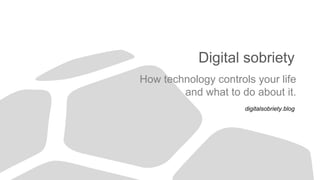
Digital Sobriety - How tech companies are controlling you and what to do about it
- 1. Digital sobriety How technology controls your life and what to do about it. digitalsobriety.blog
- 2. Let’s start with a few questions • How did you wake up this morning? • What do you do first and last thing in the morning? • How did you do research for work/university? • How did you decide what to eat today? • What do you use to plan tasks for the day? • How do you stay in touch with your family and friends? digitalsobriety.blog
- 3. The answer for a lot of these was probably technology, in some way or the other. • Be it software or physical devices, we’re constantly relying on technology to manage our busy lives. • In a way, it’s become necessary in order to simply keep up with our daily duties. digitalsobriety.blog
- 4. 4.66 BILLION digitalsobriety.blog AS OF JANUARY 2021 THERE ARE ACTIVE SOCIAL MEDIA USERS Statista, Joseph Johnson, 2021
- 5. 1.9 BILLION digitalsobriety.blog PEOPLE USE FACEBOOK EVERY DAY Facebook report, July 2021
- 6. Chances are, you’re probably using at least 2-3 social media, and own at least one smartphone. You most likely also spend over 3h per day on your phone, outside of work-related apps. Maybe you even downloaded some fitness or health related app at some point too. digitalsobriety.blog
- 7. digitalsobriety.blog How would you feel if I told you big tech companies like Facebook, Google, and others are constantly tracking, analyzing and monetizing your every move? • Looking up random information (sensitive or otherwise) • Chatting with friends online or offline (i.e. phone calls) • Making a purchase • Liking, replying to, making a post on social media • Collaborating on a project online • How long you slept for • If you exercise, how often and your progress • Discussing private matters with family members • Where you live, work, hang out and how you commute every day • And much, much more...
- 8. This is how tech companies grow 1. They create and advertise a ‘free’ product with a nice design that’s easy to learn the mechanics of; 2. You end up talking about it with your friends and family 3. They start using it too and sharing it with their own network. 4. The product gets popular, you get a decent platform free of charge. It’s a win-win, right? Well, no. digitalsobriety.blog
- 9. If you were paying attention in the previous slide, you might have noticed the ‘’ sign around the word free. That is because there is no such thing as a free product. We grew up knowing that ‘no free meal’ is a rule of life, and the same principle applies here. Companies are not philanthropists, they are businesses. So, where does their revenue come from? digitalsobriety.blog
- 10. Their business model tends to rely on metadata they collect from you, and then they analyze it. Metadata is any data that isn’t directly readable off a report, but can be guessed by analyzing or observing patterns. Example: A company can’t understand what you said exactly through a phone call, but they can tell that you made a call to the hospital and your husband within 3 minutes, and that you were previously Googling ‘did my water break’. digitalsobriety.blog
- 11. Now we know that you’re not as anonymous as you might have thought. But so what, right? They’re collecting some information and selling it to advertisers. Why should you care? The answer to this question largely depends on your comfort level. digitalsobriety.blog
- 12. Are you comfortable with companies: • Continuously collecting data about your entire online and offline life (even when you’re not using their app) • Analyzing it to make their algorithms more refined • Passing on the information they collected to third-parties (advertisers for money or governmental bodies) • Using the information they gathered to incite you to use the app more (using variable rewards to hook you in) and to drive you into rabbit holes of more drastic news and conspiracy theory sources • Forcing you to depend on them because they’re driving smaller companies out through anti-competitive behavior • Purposely creating and refining addictive apps digitalsobriety.blog
- 13. Quick run-down of some major data breaches • June 2021: LinkedIn data breach, 700 million victims’ personal information was sold by the hacker • April 2019: Facebook data breach, 533 million users’ information was exposed publicly • May 2018: Twitter data breach, 330 million accounts hacked • March 2018: Facebook Cambridge Analytica scandal, 55 million American accounts were mined for data without consent digitalsobriety.blog
- 14. If none of the previous points made you bat an eye, this presentation probably isn’t for you, and that’s okay. But if learning about this behaviour triggered a reaction, that is a good indicator that you might benefit from the following tips. At the very least, you should learn more about the topic of online privacy and digital minimalism. digitalsobriety.blog
- 15. What you can do • Delete apps you haven’t used in the last month • Leave social media • Add DuckDuckGo web extension to your browser • Replace certain apps with more privacy-friendly alternatives • Disconnect apps (i.e., if you used Facebook, Google or Apple ID to sign into websites) • You can download a checklist of all the things you can do right now (it’s free, no email sign up): digitalsobriety.blog
- 16. I hope you found this quick presentation useful and informative. You can learn more about the topics of digital minimalism, privacy, as well as all other information in regards to digital well-being on my blog Digital Sobriety. The link to it is in the bottom right corner, but you can also scan the QR code on the right. digitalsobriety.blog